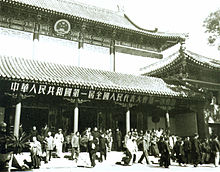
Back المكتب السياسي للحزب الشيوعي الصيني Arabic Политбюро на ЦК на ККП Bulgarian Buró Polític del Partit Comunista de la Xina Catalan Politbyro ústředního výboru Komunistické strany Číny Czech Politbureauet for det kinesiske kommunistparti Danish Politbüro der Kommunistischen Partei Chinas German Politika Buroo de Komunista Partio de Ĉinio Esperanto Buró Político del Comité Central del Partido Comunista de China Spanish Hiina KP Keskkomitee poliitbüroo Estonian پلیتبوروی حزب کمونیست چین Persian
 | |
| Information | |
|---|---|
| General Secretary | Xi Jinping |
| Elected by | Central Committee |
| Responsible to | Central Committee |
| Seats | 24 |
| Meeting place | |
 | |
| Huairen Hall, Zhongnanhai Beijing, China[1] | |
| Politburo of the Chinese Communist Party | |||||||||
|---|---|---|---|---|---|---|---|---|---|
| Simplified Chinese | 中国共产党中央委员会政治局 | ||||||||
| Traditional Chinese | 中國共產黨中央委員會政治局 | ||||||||
| Literal meaning | China Communist Party Central Committee Political Bureau | ||||||||
| |||||||||
| Politburo | |||||||||
| Chinese | 政治局 | ||||||||
| Literal meaning | Political Bureau | ||||||||
| |||||||||
 |
|---|
|
|
The Politburo of the Chinese Communist Party, officially the Political Bureau of the Central Committee of the Communist Party of China, is the highest political body of the Central Committee of the Chinese Communist Party.
Currently, the bureau is a group of 24 top officials who oversee the party and central government. The politburo is headed by a general secretary. Unlike politburos of other communist parties, power within the CCP Politburo is further centralized in the Politburo Standing Committee, a group of 7 individuals from among the larger Politburo.
The Politburo is elected by the Central Committee. In practice, however, scholars of Chinese elite politics believe that the Politburo is a self-perpetuating body, with new members of both the Politburo and its Standing Committee chosen through a series of deliberations by current Politburo members and retired Politburo Standing Committee members. The current and former Politburo members conduct a series of informal straw polls to determine the group's level of support for each new candidate's membership in the Politburo. The process for selecting the new Politburo begins with a closed door meeting by the incumbent Politburo Standing Committee in Beidaihe in the summer before the National Congress of the CCP convenes.[2][3]
The power of the Politburo resides largely in the fact that its members generally simultaneously hold positions within the People's Republic of China state positions and with the control over personnel appointments that the Politburo and Secretariat have. In addition, some Politburo members hold powerful regional positions. How the Politburo works internally is unclear, but it appears that the full Politburo meets once a month and the standing committee meets weekly. This is believed to be much less frequent than meetings of the former Soviet Politburo. The agenda for the meetings is controlled by the CCP general secretary and decisions are made by consensus rather than by majority vote.[4]
- ^ Wang, Jun (15 June 2013). "中央政治局如何开会". qikan.com. Archived from the original on 19 October 2017. Retrieved 18 October 2017.
- ^ Li, Cheng (2016). Chinese Politics in the Xi Jinping Era: Reassessing Collective Leadership. Brookings Institution. ISBN 9780815726937. Retrieved 18 October 2017.
- ^ Kang Lim, Benjamin (20 November 2017). "Exclusive: China's backroom powerbrokers block reform candidates - sources". Reuters. Retrieved 18 October 2017.
- ^ Miller, H. "Hu Jintao and the Party Politburo" (PDF). China Leadership Monitor. Hoover Institution. p. 5. Retrieved 15 October 2011.